Electoral Violence in Nigeria: Historical Context, Causes, and Impact
VerifiedAdded on 2020/12/01
|69
|21845
|142
Essay
AI Summary
This essay provides a comprehensive analysis of electoral violence in Nigeria, tracing its roots from the colonial era through the Fourth Republic. It examines the key challenges that have plagued the country's electoral processes, including violence, manipulation, and rigging. The essay delves into the historical context, exploring specific instances of violence and their impact on democratic consolidation. It identifies the causes of electoral violence, such as ethnic divisions, political opportunism, and weak institutions. The study highlights the consequences of electoral violence, including loss of legitimacy, low voter turnout, and political instability. The essay further discusses the role of various stakeholders, including political parties, the electoral management body, and security agencies, in perpetuating or mitigating violence. It also touches upon the role of international actors. Overall, the essay provides insights into the complexities of electoral violence in Nigeria and its implications for the country's democratic future.
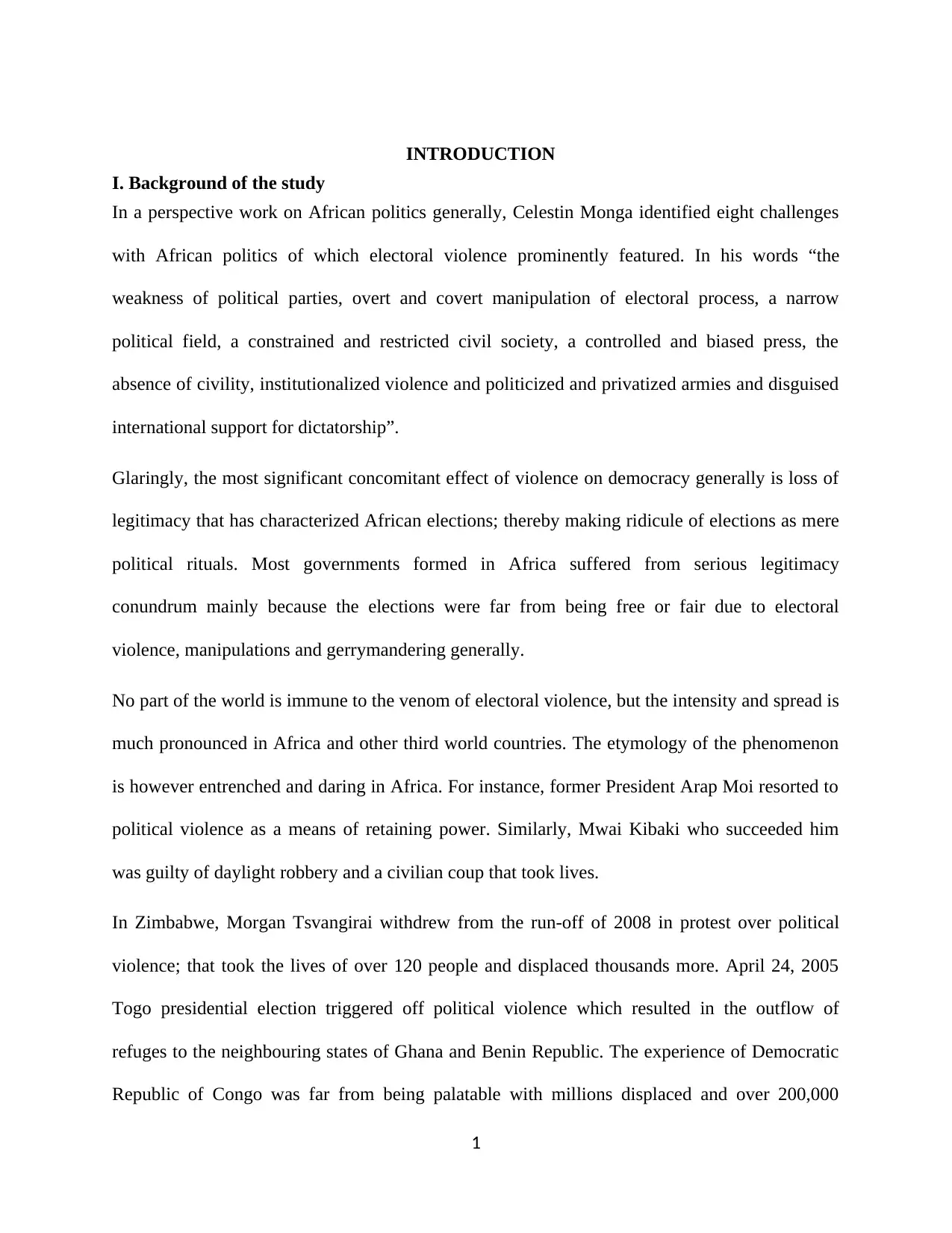
INTRODUCTION
I. Background of the study
In a perspective work on African politics generally, Celestin Monga identified eight challenges
with African politics of which electoral violence prominently featured. In his words “the
weakness of political parties, overt and covert manipulation of electoral process, a narrow
political field, a constrained and restricted civil society, a controlled and biased press, the
absence of civility, institutionalized violence and politicized and privatized armies and disguised
international support for dictatorship”.
Glaringly, the most significant concomitant effect of violence on democracy generally is loss of
legitimacy that has characterized African elections; thereby making ridicule of elections as mere
political rituals. Most governments formed in Africa suffered from serious legitimacy
conundrum mainly because the elections were far from being free or fair due to electoral
violence, manipulations and gerrymandering generally.
No part of the world is immune to the venom of electoral violence, but the intensity and spread is
much pronounced in Africa and other third world countries. The etymology of the phenomenon
is however entrenched and daring in Africa. For instance, former President Arap Moi resorted to
political violence as a means of retaining power. Similarly, Mwai Kibaki who succeeded him
was guilty of daylight robbery and a civilian coup that took lives.
In Zimbabwe, Morgan Tsvangirai withdrew from the run-off of 2008 in protest over political
violence; that took the lives of over 120 people and displaced thousands more. April 24, 2005
Togo presidential election triggered off political violence which resulted in the outflow of
refuges to the neighbouring states of Ghana and Benin Republic. The experience of Democratic
Republic of Congo was far from being palatable with millions displaced and over 200,000
1
I. Background of the study
In a perspective work on African politics generally, Celestin Monga identified eight challenges
with African politics of which electoral violence prominently featured. In his words “the
weakness of political parties, overt and covert manipulation of electoral process, a narrow
political field, a constrained and restricted civil society, a controlled and biased press, the
absence of civility, institutionalized violence and politicized and privatized armies and disguised
international support for dictatorship”.
Glaringly, the most significant concomitant effect of violence on democracy generally is loss of
legitimacy that has characterized African elections; thereby making ridicule of elections as mere
political rituals. Most governments formed in Africa suffered from serious legitimacy
conundrum mainly because the elections were far from being free or fair due to electoral
violence, manipulations and gerrymandering generally.
No part of the world is immune to the venom of electoral violence, but the intensity and spread is
much pronounced in Africa and other third world countries. The etymology of the phenomenon
is however entrenched and daring in Africa. For instance, former President Arap Moi resorted to
political violence as a means of retaining power. Similarly, Mwai Kibaki who succeeded him
was guilty of daylight robbery and a civilian coup that took lives.
In Zimbabwe, Morgan Tsvangirai withdrew from the run-off of 2008 in protest over political
violence; that took the lives of over 120 people and displaced thousands more. April 24, 2005
Togo presidential election triggered off political violence which resulted in the outflow of
refuges to the neighbouring states of Ghana and Benin Republic. The experience of Democratic
Republic of Congo was far from being palatable with millions displaced and over 200,000
1
Paraphrase This Document
Need a fresh take? Get an instant paraphrase of this document with our AI Paraphraser
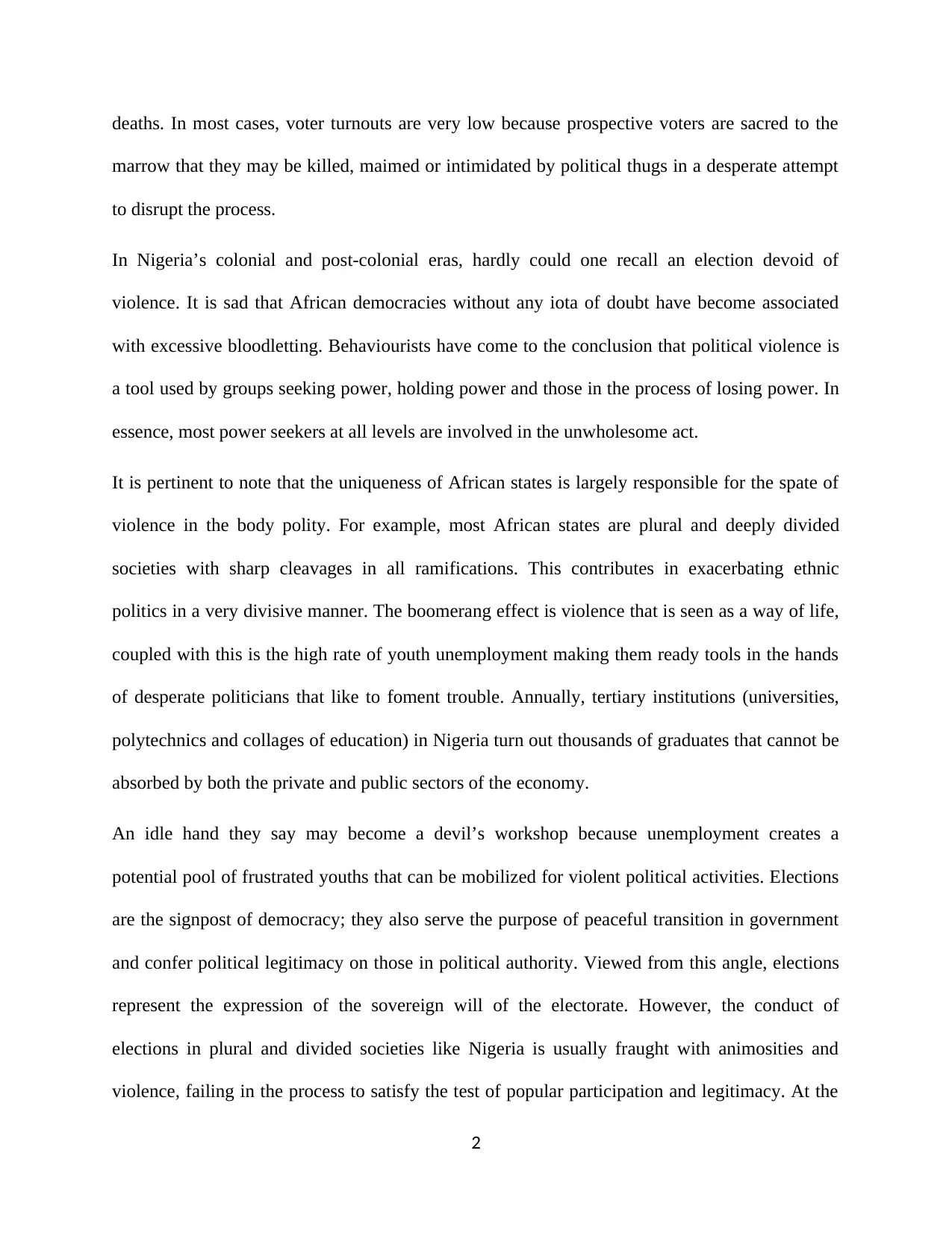
deaths. In most cases, voter turnouts are very low because prospective voters are sacred to the
marrow that they may be killed, maimed or intimidated by political thugs in a desperate attempt
to disrupt the process.
In Nigeria’s colonial and post-colonial eras, hardly could one recall an election devoid of
violence. It is sad that African democracies without any iota of doubt have become associated
with excessive bloodletting. Behaviourists have come to the conclusion that political violence is
a tool used by groups seeking power, holding power and those in the process of losing power. In
essence, most power seekers at all levels are involved in the unwholesome act.
It is pertinent to note that the uniqueness of African states is largely responsible for the spate of
violence in the body polity. For example, most African states are plural and deeply divided
societies with sharp cleavages in all ramifications. This contributes in exacerbating ethnic
politics in a very divisive manner. The boomerang effect is violence that is seen as a way of life,
coupled with this is the high rate of youth unemployment making them ready tools in the hands
of desperate politicians that like to foment trouble. Annually, tertiary institutions (universities,
polytechnics and collages of education) in Nigeria turn out thousands of graduates that cannot be
absorbed by both the private and public sectors of the economy.
An idle hand they say may become a devil’s workshop because unemployment creates a
potential pool of frustrated youths that can be mobilized for violent political activities. Elections
are the signpost of democracy; they also serve the purpose of peaceful transition in government
and confer political legitimacy on those in political authority. Viewed from this angle, elections
represent the expression of the sovereign will of the electorate. However, the conduct of
elections in plural and divided societies like Nigeria is usually fraught with animosities and
violence, failing in the process to satisfy the test of popular participation and legitimacy. At the
2
marrow that they may be killed, maimed or intimidated by political thugs in a desperate attempt
to disrupt the process.
In Nigeria’s colonial and post-colonial eras, hardly could one recall an election devoid of
violence. It is sad that African democracies without any iota of doubt have become associated
with excessive bloodletting. Behaviourists have come to the conclusion that political violence is
a tool used by groups seeking power, holding power and those in the process of losing power. In
essence, most power seekers at all levels are involved in the unwholesome act.
It is pertinent to note that the uniqueness of African states is largely responsible for the spate of
violence in the body polity. For example, most African states are plural and deeply divided
societies with sharp cleavages in all ramifications. This contributes in exacerbating ethnic
politics in a very divisive manner. The boomerang effect is violence that is seen as a way of life,
coupled with this is the high rate of youth unemployment making them ready tools in the hands
of desperate politicians that like to foment trouble. Annually, tertiary institutions (universities,
polytechnics and collages of education) in Nigeria turn out thousands of graduates that cannot be
absorbed by both the private and public sectors of the economy.
An idle hand they say may become a devil’s workshop because unemployment creates a
potential pool of frustrated youths that can be mobilized for violent political activities. Elections
are the signpost of democracy; they also serve the purpose of peaceful transition in government
and confer political legitimacy on those in political authority. Viewed from this angle, elections
represent the expression of the sovereign will of the electorate. However, the conduct of
elections in plural and divided societies like Nigeria is usually fraught with animosities and
violence, failing in the process to satisfy the test of popular participation and legitimacy. At the
2
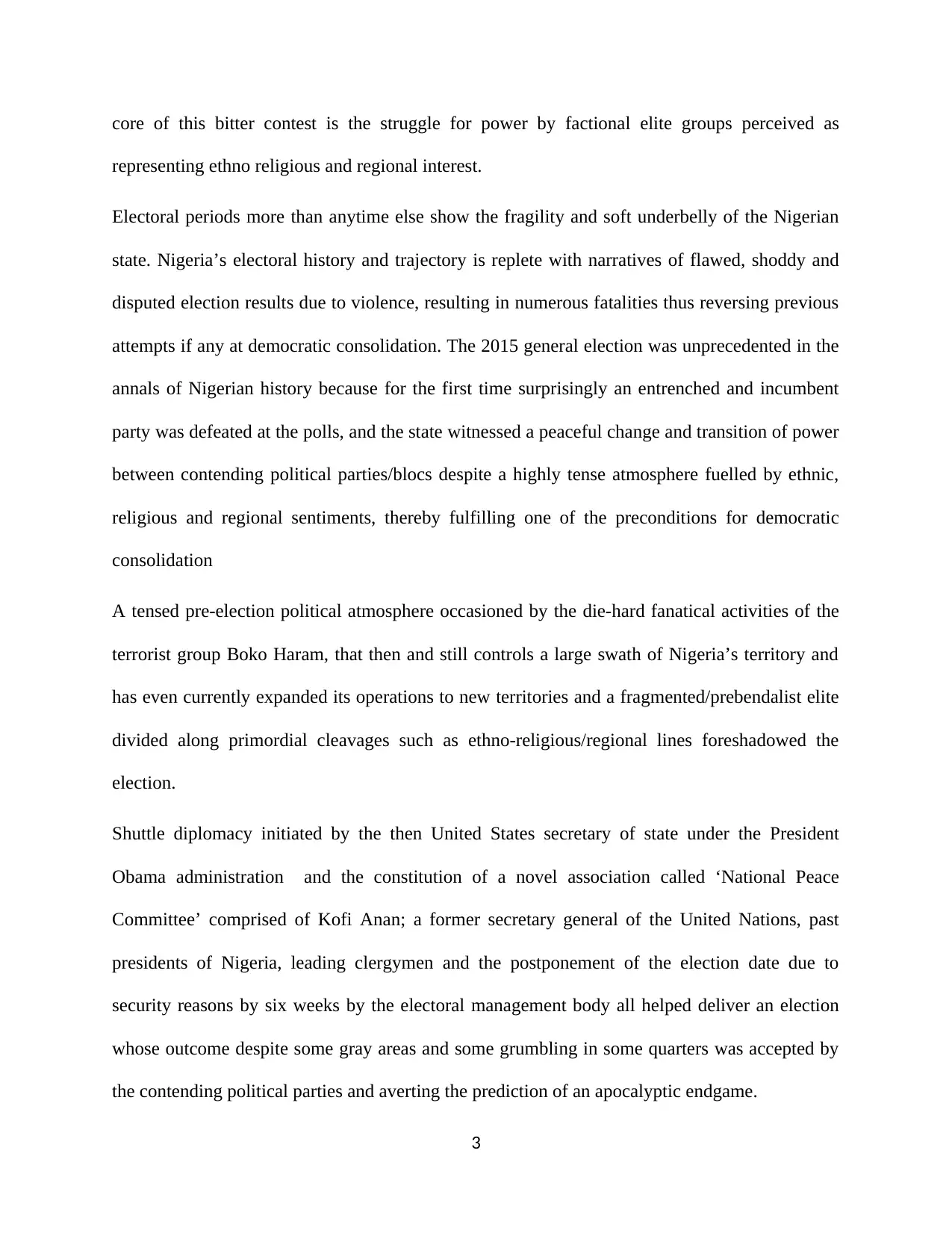
core of this bitter contest is the struggle for power by factional elite groups perceived as
representing ethno religious and regional interest.
Electoral periods more than anytime else show the fragility and soft underbelly of the Nigerian
state. Nigeria’s electoral history and trajectory is replete with narratives of flawed, shoddy and
disputed election results due to violence, resulting in numerous fatalities thus reversing previous
attempts if any at democratic consolidation. The 2015 general election was unprecedented in the
annals of Nigerian history because for the first time surprisingly an entrenched and incumbent
party was defeated at the polls, and the state witnessed a peaceful change and transition of power
between contending political parties/blocs despite a highly tense atmosphere fuelled by ethnic,
religious and regional sentiments, thereby fulfilling one of the preconditions for democratic
consolidation
A tensed pre-election political atmosphere occasioned by the die-hard fanatical activities of the
terrorist group Boko Haram, that then and still controls a large swath of Nigeria’s territory and
has even currently expanded its operations to new territories and a fragmented/prebendalist elite
divided along primordial cleavages such as ethno-religious/regional lines foreshadowed the
election.
Shuttle diplomacy initiated by the then United States secretary of state under the President
Obama administration and the constitution of a novel association called ‘National Peace
Committee’ comprised of Kofi Anan; a former secretary general of the United Nations, past
presidents of Nigeria, leading clergymen and the postponement of the election date due to
security reasons by six weeks by the electoral management body all helped deliver an election
whose outcome despite some gray areas and some grumbling in some quarters was accepted by
the contending political parties and averting the prediction of an apocalyptic endgame.
3
representing ethno religious and regional interest.
Electoral periods more than anytime else show the fragility and soft underbelly of the Nigerian
state. Nigeria’s electoral history and trajectory is replete with narratives of flawed, shoddy and
disputed election results due to violence, resulting in numerous fatalities thus reversing previous
attempts if any at democratic consolidation. The 2015 general election was unprecedented in the
annals of Nigerian history because for the first time surprisingly an entrenched and incumbent
party was defeated at the polls, and the state witnessed a peaceful change and transition of power
between contending political parties/blocs despite a highly tense atmosphere fuelled by ethnic,
religious and regional sentiments, thereby fulfilling one of the preconditions for democratic
consolidation
A tensed pre-election political atmosphere occasioned by the die-hard fanatical activities of the
terrorist group Boko Haram, that then and still controls a large swath of Nigeria’s territory and
has even currently expanded its operations to new territories and a fragmented/prebendalist elite
divided along primordial cleavages such as ethno-religious/regional lines foreshadowed the
election.
Shuttle diplomacy initiated by the then United States secretary of state under the President
Obama administration and the constitution of a novel association called ‘National Peace
Committee’ comprised of Kofi Anan; a former secretary general of the United Nations, past
presidents of Nigeria, leading clergymen and the postponement of the election date due to
security reasons by six weeks by the electoral management body all helped deliver an election
whose outcome despite some gray areas and some grumbling in some quarters was accepted by
the contending political parties and averting the prediction of an apocalyptic endgame.
3
⊘ This is a preview!⊘
Do you want full access?
Subscribe today to unlock all pages.

Trusted by 1+ million students worldwide
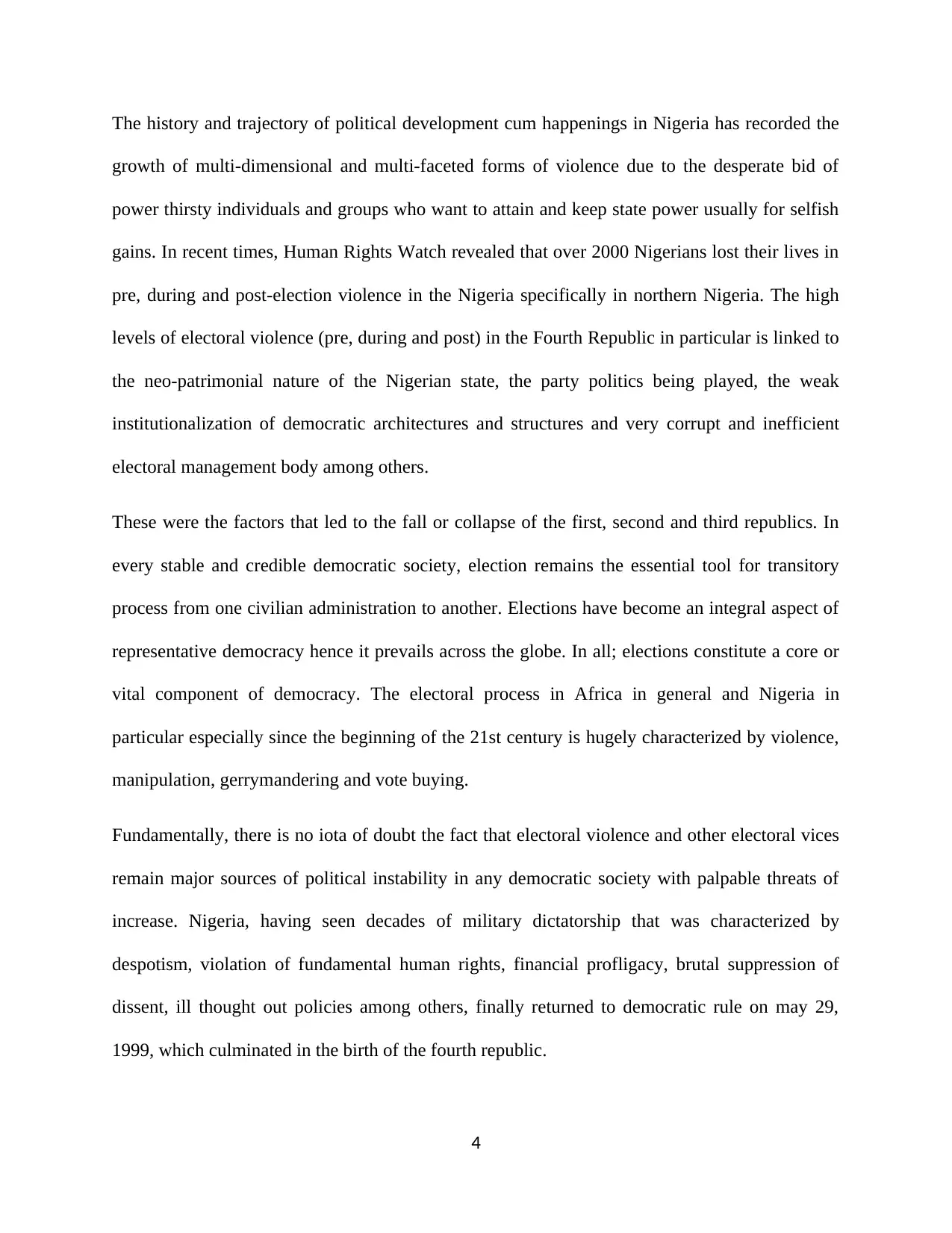
The history and trajectory of political development cum happenings in Nigeria has recorded the
growth of multi-dimensional and multi-faceted forms of violence due to the desperate bid of
power thirsty individuals and groups who want to attain and keep state power usually for selfish
gains. In recent times, Human Rights Watch revealed that over 2000 Nigerians lost their lives in
pre, during and post-election violence in the Nigeria specifically in northern Nigeria. The high
levels of electoral violence (pre, during and post) in the Fourth Republic in particular is linked to
the neo-patrimonial nature of the Nigerian state, the party politics being played, the weak
institutionalization of democratic architectures and structures and very corrupt and inefficient
electoral management body among others.
These were the factors that led to the fall or collapse of the first, second and third republics. In
every stable and credible democratic society, election remains the essential tool for transitory
process from one civilian administration to another. Elections have become an integral aspect of
representative democracy hence it prevails across the globe. In all; elections constitute a core or
vital component of democracy. The electoral process in Africa in general and Nigeria in
particular especially since the beginning of the 21st century is hugely characterized by violence,
manipulation, gerrymandering and vote buying.
Fundamentally, there is no iota of doubt the fact that electoral violence and other electoral vices
remain major sources of political instability in any democratic society with palpable threats of
increase. Nigeria, having seen decades of military dictatorship that was characterized by
despotism, violation of fundamental human rights, financial profligacy, brutal suppression of
dissent, ill thought out policies among others, finally returned to democratic rule on may 29,
1999, which culminated in the birth of the fourth republic.
4
growth of multi-dimensional and multi-faceted forms of violence due to the desperate bid of
power thirsty individuals and groups who want to attain and keep state power usually for selfish
gains. In recent times, Human Rights Watch revealed that over 2000 Nigerians lost their lives in
pre, during and post-election violence in the Nigeria specifically in northern Nigeria. The high
levels of electoral violence (pre, during and post) in the Fourth Republic in particular is linked to
the neo-patrimonial nature of the Nigerian state, the party politics being played, the weak
institutionalization of democratic architectures and structures and very corrupt and inefficient
electoral management body among others.
These were the factors that led to the fall or collapse of the first, second and third republics. In
every stable and credible democratic society, election remains the essential tool for transitory
process from one civilian administration to another. Elections have become an integral aspect of
representative democracy hence it prevails across the globe. In all; elections constitute a core or
vital component of democracy. The electoral process in Africa in general and Nigeria in
particular especially since the beginning of the 21st century is hugely characterized by violence,
manipulation, gerrymandering and vote buying.
Fundamentally, there is no iota of doubt the fact that electoral violence and other electoral vices
remain major sources of political instability in any democratic society with palpable threats of
increase. Nigeria, having seen decades of military dictatorship that was characterized by
despotism, violation of fundamental human rights, financial profligacy, brutal suppression of
dissent, ill thought out policies among others, finally returned to democratic rule on may 29,
1999, which culminated in the birth of the fourth republic.
4
Paraphrase This Document
Need a fresh take? Get an instant paraphrase of this document with our AI Paraphraser
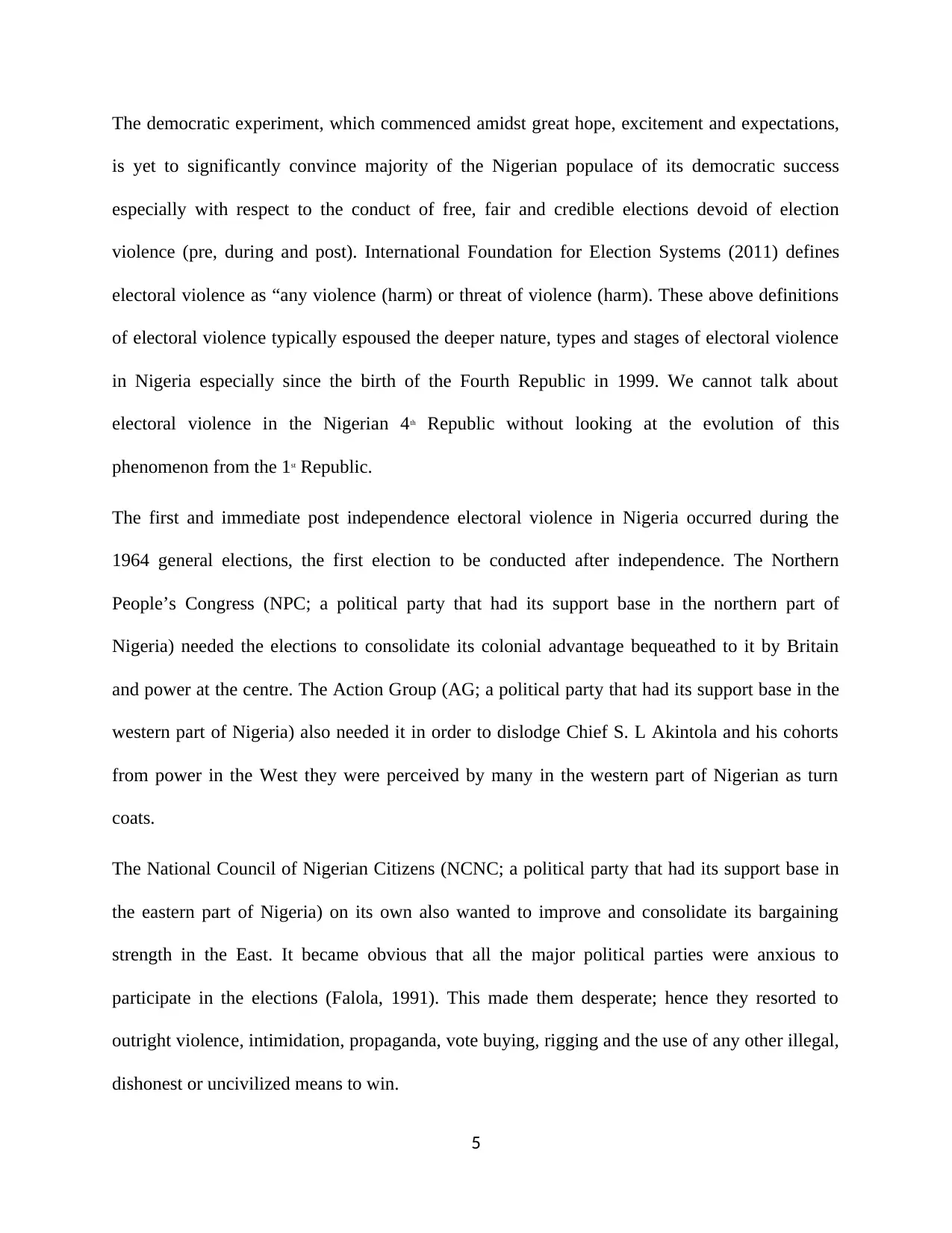
The democratic experiment, which commenced amidst great hope, excitement and expectations,
is yet to significantly convince majority of the Nigerian populace of its democratic success
especially with respect to the conduct of free, fair and credible elections devoid of election
violence (pre, during and post). International Foundation for Election Systems (2011) defines
electoral violence as “any violence (harm) or threat of violence (harm). These above definitions
of electoral violence typically espoused the deeper nature, types and stages of electoral violence
in Nigeria especially since the birth of the Fourth Republic in 1999. We cannot talk about
electoral violence in the Nigerian 4th Republic without looking at the evolution of this
phenomenon from the 1st Republic.
The first and immediate post independence electoral violence in Nigeria occurred during the
1964 general elections, the first election to be conducted after independence. The Northern
People’s Congress (NPC; a political party that had its support base in the northern part of
Nigeria) needed the elections to consolidate its colonial advantage bequeathed to it by Britain
and power at the centre. The Action Group (AG; a political party that had its support base in the
western part of Nigeria) also needed it in order to dislodge Chief S. L Akintola and his cohorts
from power in the West they were perceived by many in the western part of Nigerian as turn
coats.
The National Council of Nigerian Citizens (NCNC; a political party that had its support base in
the eastern part of Nigeria) on its own also wanted to improve and consolidate its bargaining
strength in the East. It became obvious that all the major political parties were anxious to
participate in the elections (Falola, 1991). This made them desperate; hence they resorted to
outright violence, intimidation, propaganda, vote buying, rigging and the use of any other illegal,
dishonest or uncivilized means to win.
5
is yet to significantly convince majority of the Nigerian populace of its democratic success
especially with respect to the conduct of free, fair and credible elections devoid of election
violence (pre, during and post). International Foundation for Election Systems (2011) defines
electoral violence as “any violence (harm) or threat of violence (harm). These above definitions
of electoral violence typically espoused the deeper nature, types and stages of electoral violence
in Nigeria especially since the birth of the Fourth Republic in 1999. We cannot talk about
electoral violence in the Nigerian 4th Republic without looking at the evolution of this
phenomenon from the 1st Republic.
The first and immediate post independence electoral violence in Nigeria occurred during the
1964 general elections, the first election to be conducted after independence. The Northern
People’s Congress (NPC; a political party that had its support base in the northern part of
Nigeria) needed the elections to consolidate its colonial advantage bequeathed to it by Britain
and power at the centre. The Action Group (AG; a political party that had its support base in the
western part of Nigeria) also needed it in order to dislodge Chief S. L Akintola and his cohorts
from power in the West they were perceived by many in the western part of Nigerian as turn
coats.
The National Council of Nigerian Citizens (NCNC; a political party that had its support base in
the eastern part of Nigeria) on its own also wanted to improve and consolidate its bargaining
strength in the East. It became obvious that all the major political parties were anxious to
participate in the elections (Falola, 1991). This made them desperate; hence they resorted to
outright violence, intimidation, propaganda, vote buying, rigging and the use of any other illegal,
dishonest or uncivilized means to win.
5
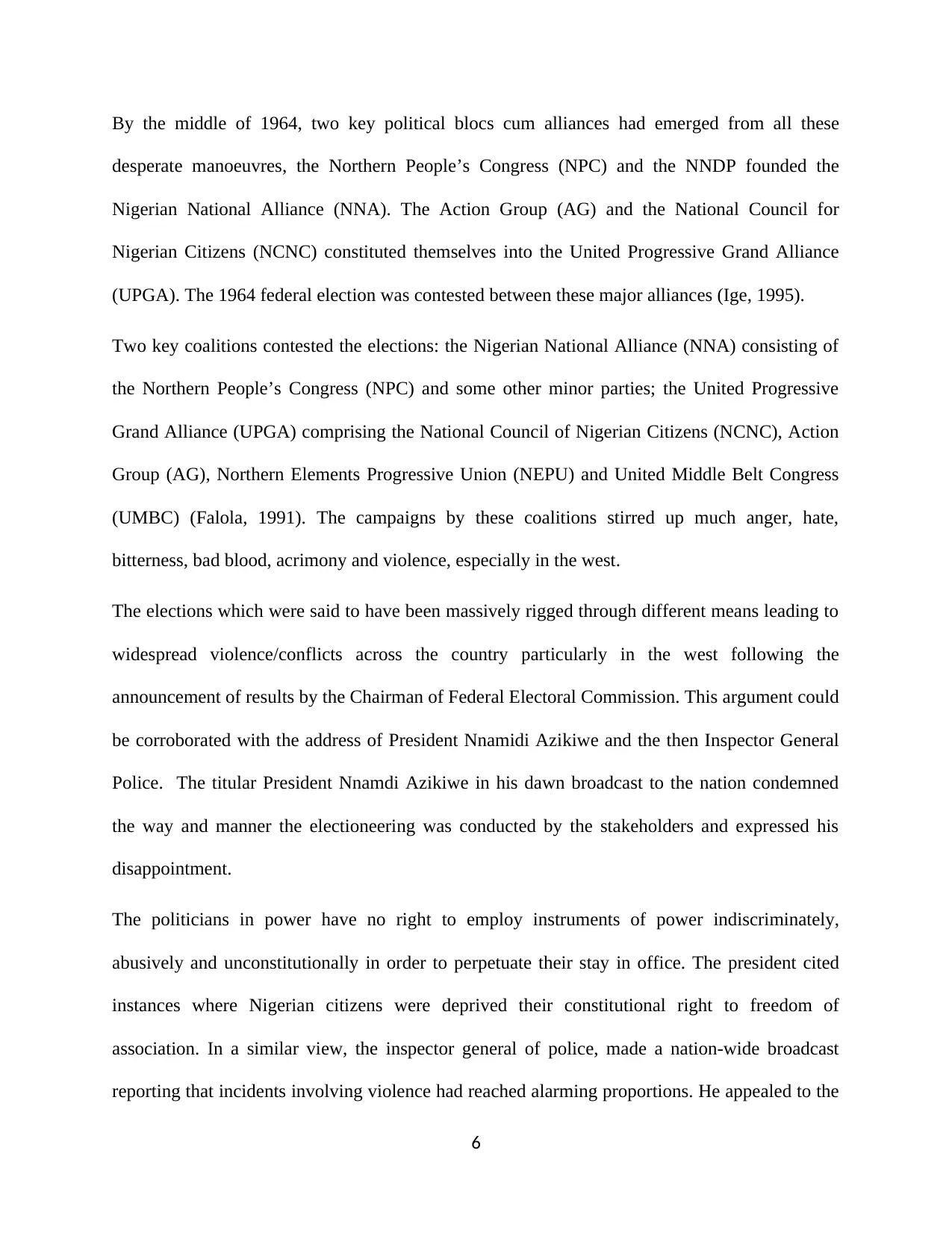
By the middle of 1964, two key political blocs cum alliances had emerged from all these
desperate manoeuvres, the Northern People’s Congress (NPC) and the NNDP founded the
Nigerian National Alliance (NNA). The Action Group (AG) and the National Council for
Nigerian Citizens (NCNC) constituted themselves into the United Progressive Grand Alliance
(UPGA). The 1964 federal election was contested between these major alliances (Ige, 1995).
Two key coalitions contested the elections: the Nigerian National Alliance (NNA) consisting of
the Northern People’s Congress (NPC) and some other minor parties; the United Progressive
Grand Alliance (UPGA) comprising the National Council of Nigerian Citizens (NCNC), Action
Group (AG), Northern Elements Progressive Union (NEPU) and United Middle Belt Congress
(UMBC) (Falola, 1991). The campaigns by these coalitions stirred up much anger, hate,
bitterness, bad blood, acrimony and violence, especially in the west.
The elections which were said to have been massively rigged through different means leading to
widespread violence/conflicts across the country particularly in the west following the
announcement of results by the Chairman of Federal Electoral Commission. This argument could
be corroborated with the address of President Nnamidi Azikiwe and the then Inspector General
Police. The titular President Nnamdi Azikiwe in his dawn broadcast to the nation condemned
the way and manner the electioneering was conducted by the stakeholders and expressed his
disappointment.
The politicians in power have no right to employ instruments of power indiscriminately,
abusively and unconstitutionally in order to perpetuate their stay in office. The president cited
instances where Nigerian citizens were deprived their constitutional right to freedom of
association. In a similar view, the inspector general of police, made a nation-wide broadcast
reporting that incidents involving violence had reached alarming proportions. He appealed to the
6
desperate manoeuvres, the Northern People’s Congress (NPC) and the NNDP founded the
Nigerian National Alliance (NNA). The Action Group (AG) and the National Council for
Nigerian Citizens (NCNC) constituted themselves into the United Progressive Grand Alliance
(UPGA). The 1964 federal election was contested between these major alliances (Ige, 1995).
Two key coalitions contested the elections: the Nigerian National Alliance (NNA) consisting of
the Northern People’s Congress (NPC) and some other minor parties; the United Progressive
Grand Alliance (UPGA) comprising the National Council of Nigerian Citizens (NCNC), Action
Group (AG), Northern Elements Progressive Union (NEPU) and United Middle Belt Congress
(UMBC) (Falola, 1991). The campaigns by these coalitions stirred up much anger, hate,
bitterness, bad blood, acrimony and violence, especially in the west.
The elections which were said to have been massively rigged through different means leading to
widespread violence/conflicts across the country particularly in the west following the
announcement of results by the Chairman of Federal Electoral Commission. This argument could
be corroborated with the address of President Nnamidi Azikiwe and the then Inspector General
Police. The titular President Nnamdi Azikiwe in his dawn broadcast to the nation condemned
the way and manner the electioneering was conducted by the stakeholders and expressed his
disappointment.
The politicians in power have no right to employ instruments of power indiscriminately,
abusively and unconstitutionally in order to perpetuate their stay in office. The president cited
instances where Nigerian citizens were deprived their constitutional right to freedom of
association. In a similar view, the inspector general of police, made a nation-wide broadcast
reporting that incidents involving violence had reached alarming proportions. He appealed to the
6
⊘ This is a preview!⊘
Do you want full access?
Subscribe today to unlock all pages.

Trusted by 1+ million students worldwide
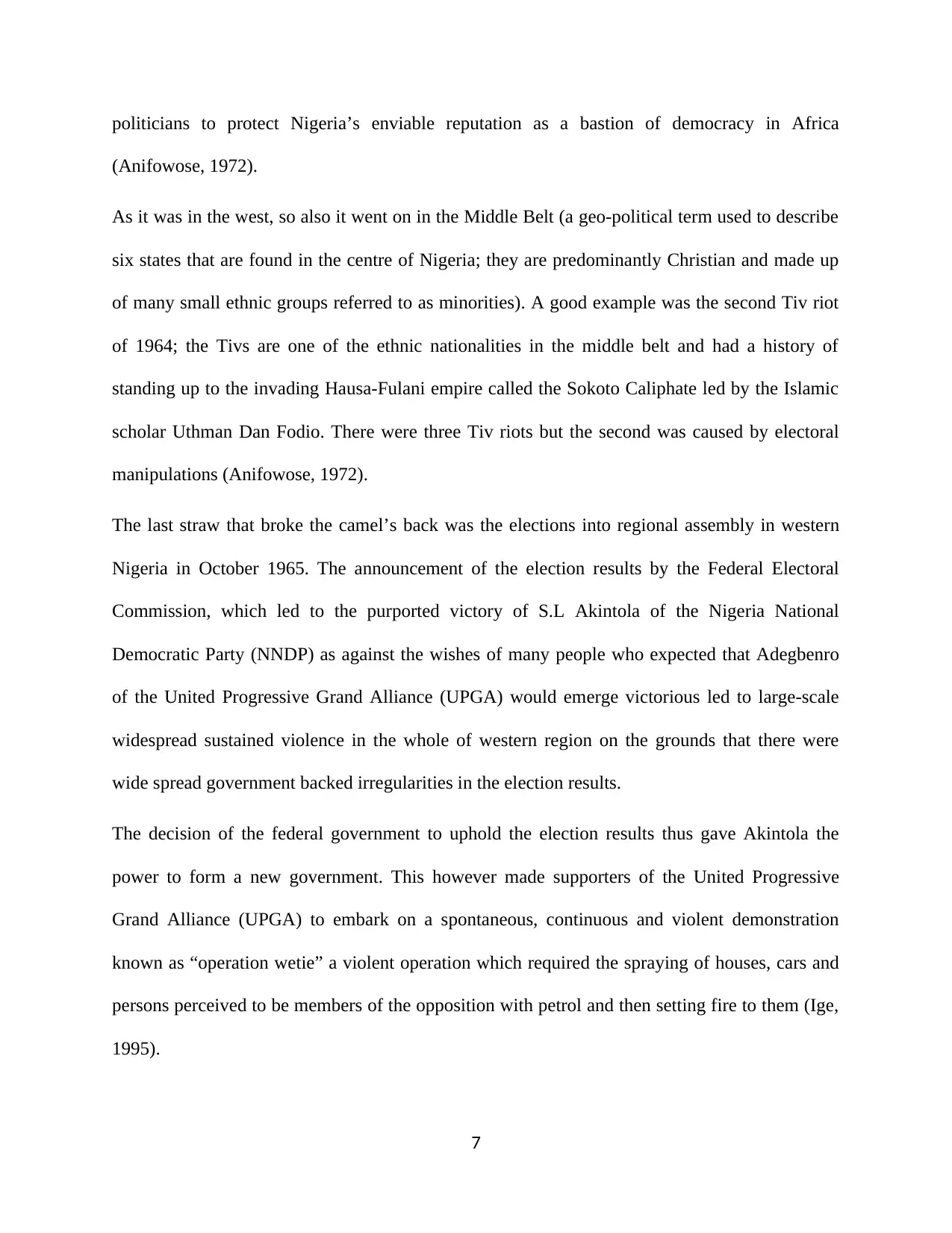
politicians to protect Nigeria’s enviable reputation as a bastion of democracy in Africa
(Anifowose, 1972).
As it was in the west, so also it went on in the Middle Belt (a geo-political term used to describe
six states that are found in the centre of Nigeria; they are predominantly Christian and made up
of many small ethnic groups referred to as minorities). A good example was the second Tiv riot
of 1964; the Tivs are one of the ethnic nationalities in the middle belt and had a history of
standing up to the invading Hausa-Fulani empire called the Sokoto Caliphate led by the Islamic
scholar Uthman Dan Fodio. There were three Tiv riots but the second was caused by electoral
manipulations (Anifowose, 1972).
The last straw that broke the camel’s back was the elections into regional assembly in western
Nigeria in October 1965. The announcement of the election results by the Federal Electoral
Commission, which led to the purported victory of S.L Akintola of the Nigeria National
Democratic Party (NNDP) as against the wishes of many people who expected that Adegbenro
of the United Progressive Grand Alliance (UPGA) would emerge victorious led to large-scale
widespread sustained violence in the whole of western region on the grounds that there were
wide spread government backed irregularities in the election results.
The decision of the federal government to uphold the election results thus gave Akintola the
power to form a new government. This however made supporters of the United Progressive
Grand Alliance (UPGA) to embark on a spontaneous, continuous and violent demonstration
known as “operation wetie” a violent operation which required the spraying of houses, cars and
persons perceived to be members of the opposition with petrol and then setting fire to them (Ige,
1995).
7
(Anifowose, 1972).
As it was in the west, so also it went on in the Middle Belt (a geo-political term used to describe
six states that are found in the centre of Nigeria; they are predominantly Christian and made up
of many small ethnic groups referred to as minorities). A good example was the second Tiv riot
of 1964; the Tivs are one of the ethnic nationalities in the middle belt and had a history of
standing up to the invading Hausa-Fulani empire called the Sokoto Caliphate led by the Islamic
scholar Uthman Dan Fodio. There were three Tiv riots but the second was caused by electoral
manipulations (Anifowose, 1972).
The last straw that broke the camel’s back was the elections into regional assembly in western
Nigeria in October 1965. The announcement of the election results by the Federal Electoral
Commission, which led to the purported victory of S.L Akintola of the Nigeria National
Democratic Party (NNDP) as against the wishes of many people who expected that Adegbenro
of the United Progressive Grand Alliance (UPGA) would emerge victorious led to large-scale
widespread sustained violence in the whole of western region on the grounds that there were
wide spread government backed irregularities in the election results.
The decision of the federal government to uphold the election results thus gave Akintola the
power to form a new government. This however made supporters of the United Progressive
Grand Alliance (UPGA) to embark on a spontaneous, continuous and violent demonstration
known as “operation wetie” a violent operation which required the spraying of houses, cars and
persons perceived to be members of the opposition with petrol and then setting fire to them (Ige,
1995).
7
Paraphrase This Document
Need a fresh take? Get an instant paraphrase of this document with our AI Paraphraser
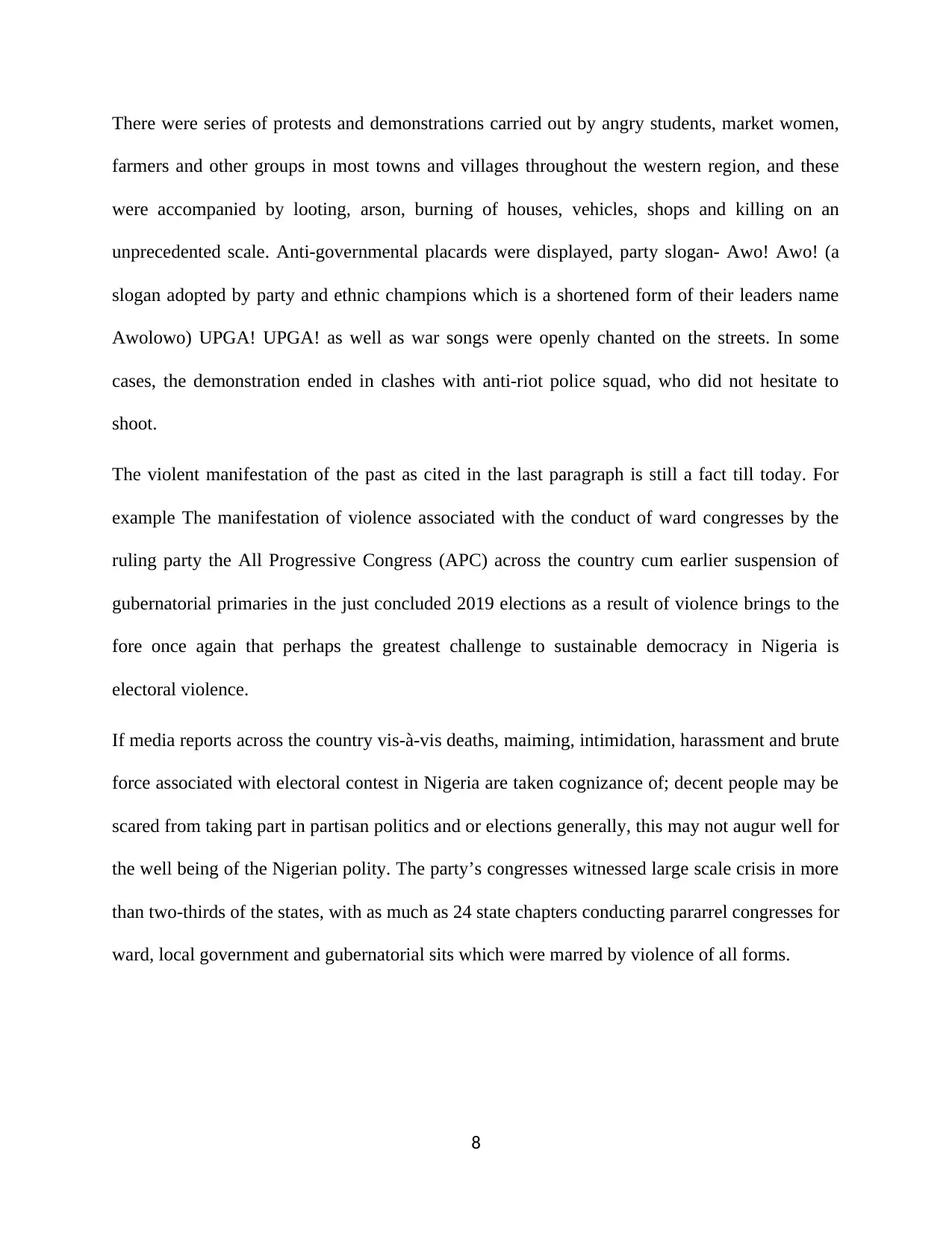
There were series of protests and demonstrations carried out by angry students, market women,
farmers and other groups in most towns and villages throughout the western region, and these
were accompanied by looting, arson, burning of houses, vehicles, shops and killing on an
unprecedented scale. Anti-governmental placards were displayed, party slogan- Awo! Awo! (a
slogan adopted by party and ethnic champions which is a shortened form of their leaders name
Awolowo) UPGA! UPGA! as well as war songs were openly chanted on the streets. In some
cases, the demonstration ended in clashes with anti-riot police squad, who did not hesitate to
shoot.
The violent manifestation of the past as cited in the last paragraph is still a fact till today. For
example The manifestation of violence associated with the conduct of ward congresses by the
ruling party the All Progressive Congress (APC) across the country cum earlier suspension of
gubernatorial primaries in the just concluded 2019 elections as a result of violence brings to the
fore once again that perhaps the greatest challenge to sustainable democracy in Nigeria is
electoral violence.
If media reports across the country vis-à-vis deaths, maiming, intimidation, harassment and brute
force associated with electoral contest in Nigeria are taken cognizance of; decent people may be
scared from taking part in partisan politics and or elections generally, this may not augur well for
the well being of the Nigerian polity. The party’s congresses witnessed large scale crisis in more
than two-thirds of the states, with as much as 24 state chapters conducting pararrel congresses for
ward, local government and gubernatorial sits which were marred by violence of all forms.
8
farmers and other groups in most towns and villages throughout the western region, and these
were accompanied by looting, arson, burning of houses, vehicles, shops and killing on an
unprecedented scale. Anti-governmental placards were displayed, party slogan- Awo! Awo! (a
slogan adopted by party and ethnic champions which is a shortened form of their leaders name
Awolowo) UPGA! UPGA! as well as war songs were openly chanted on the streets. In some
cases, the demonstration ended in clashes with anti-riot police squad, who did not hesitate to
shoot.
The violent manifestation of the past as cited in the last paragraph is still a fact till today. For
example The manifestation of violence associated with the conduct of ward congresses by the
ruling party the All Progressive Congress (APC) across the country cum earlier suspension of
gubernatorial primaries in the just concluded 2019 elections as a result of violence brings to the
fore once again that perhaps the greatest challenge to sustainable democracy in Nigeria is
electoral violence.
If media reports across the country vis-à-vis deaths, maiming, intimidation, harassment and brute
force associated with electoral contest in Nigeria are taken cognizance of; decent people may be
scared from taking part in partisan politics and or elections generally, this may not augur well for
the well being of the Nigerian polity. The party’s congresses witnessed large scale crisis in more
than two-thirds of the states, with as much as 24 state chapters conducting pararrel congresses for
ward, local government and gubernatorial sits which were marred by violence of all forms.
8
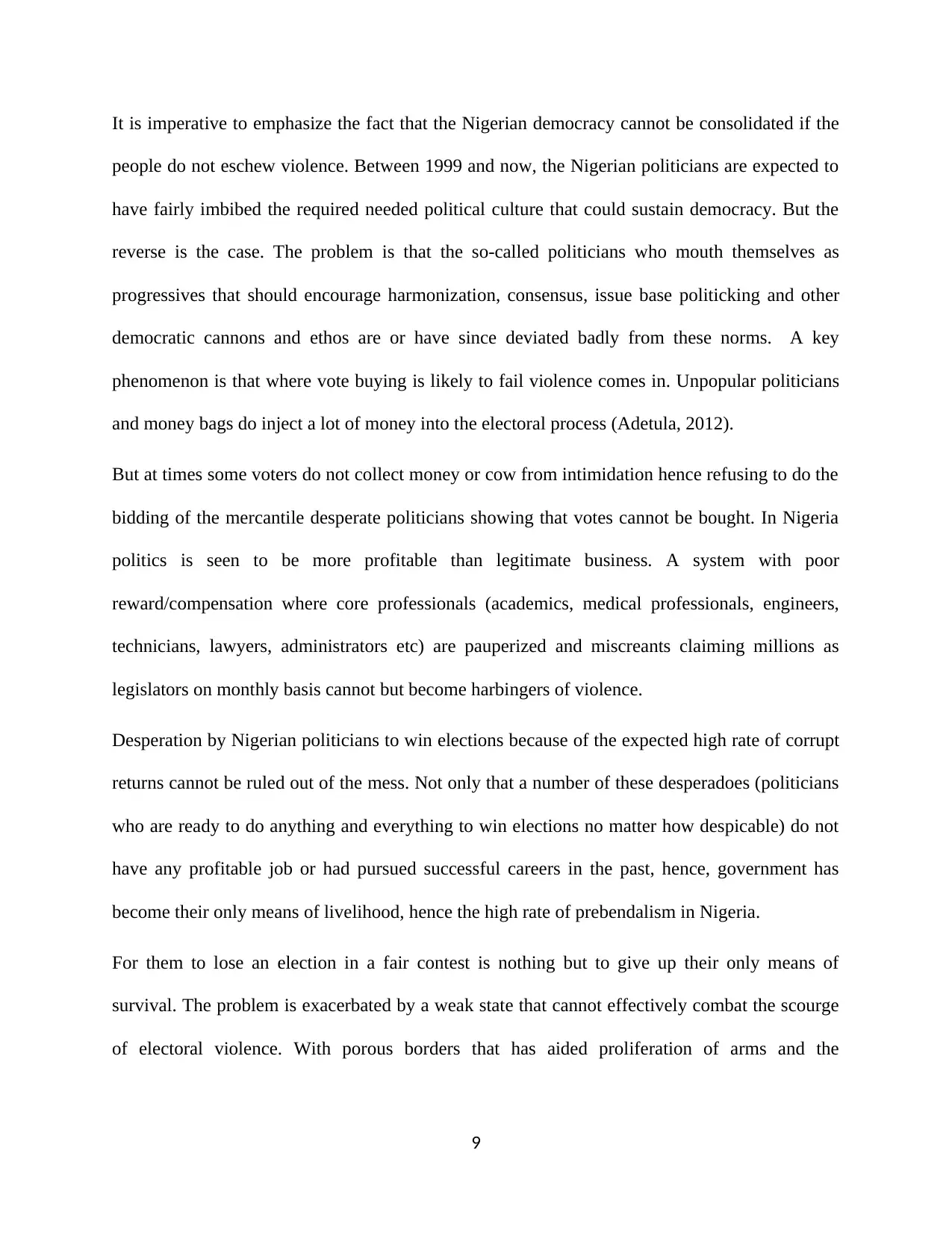
It is imperative to emphasize the fact that the Nigerian democracy cannot be consolidated if the
people do not eschew violence. Between 1999 and now, the Nigerian politicians are expected to
have fairly imbibed the required needed political culture that could sustain democracy. But the
reverse is the case. The problem is that the so-called politicians who mouth themselves as
progressives that should encourage harmonization, consensus, issue base politicking and other
democratic cannons and ethos are or have since deviated badly from these norms. A key
phenomenon is that where vote buying is likely to fail violence comes in. Unpopular politicians
and money bags do inject a lot of money into the electoral process (Adetula, 2012).
But at times some voters do not collect money or cow from intimidation hence refusing to do the
bidding of the mercantile desperate politicians showing that votes cannot be bought. In Nigeria
politics is seen to be more profitable than legitimate business. A system with poor
reward/compensation where core professionals (academics, medical professionals, engineers,
technicians, lawyers, administrators etc) are pauperized and miscreants claiming millions as
legislators on monthly basis cannot but become harbingers of violence.
Desperation by Nigerian politicians to win elections because of the expected high rate of corrupt
returns cannot be ruled out of the mess. Not only that a number of these desperadoes (politicians
who are ready to do anything and everything to win elections no matter how despicable) do not
have any profitable job or had pursued successful careers in the past, hence, government has
become their only means of livelihood, hence the high rate of prebendalism in Nigeria.
For them to lose an election in a fair contest is nothing but to give up their only means of
survival. The problem is exacerbated by a weak state that cannot effectively combat the scourge
of electoral violence. With porous borders that has aided proliferation of arms and the
9
people do not eschew violence. Between 1999 and now, the Nigerian politicians are expected to
have fairly imbibed the required needed political culture that could sustain democracy. But the
reverse is the case. The problem is that the so-called politicians who mouth themselves as
progressives that should encourage harmonization, consensus, issue base politicking and other
democratic cannons and ethos are or have since deviated badly from these norms. A key
phenomenon is that where vote buying is likely to fail violence comes in. Unpopular politicians
and money bags do inject a lot of money into the electoral process (Adetula, 2012).
But at times some voters do not collect money or cow from intimidation hence refusing to do the
bidding of the mercantile desperate politicians showing that votes cannot be bought. In Nigeria
politics is seen to be more profitable than legitimate business. A system with poor
reward/compensation where core professionals (academics, medical professionals, engineers,
technicians, lawyers, administrators etc) are pauperized and miscreants claiming millions as
legislators on monthly basis cannot but become harbingers of violence.
Desperation by Nigerian politicians to win elections because of the expected high rate of corrupt
returns cannot be ruled out of the mess. Not only that a number of these desperadoes (politicians
who are ready to do anything and everything to win elections no matter how despicable) do not
have any profitable job or had pursued successful careers in the past, hence, government has
become their only means of livelihood, hence the high rate of prebendalism in Nigeria.
For them to lose an election in a fair contest is nothing but to give up their only means of
survival. The problem is exacerbated by a weak state that cannot effectively combat the scourge
of electoral violence. With porous borders that has aided proliferation of arms and the
9
⊘ This is a preview!⊘
Do you want full access?
Subscribe today to unlock all pages.

Trusted by 1+ million students worldwide
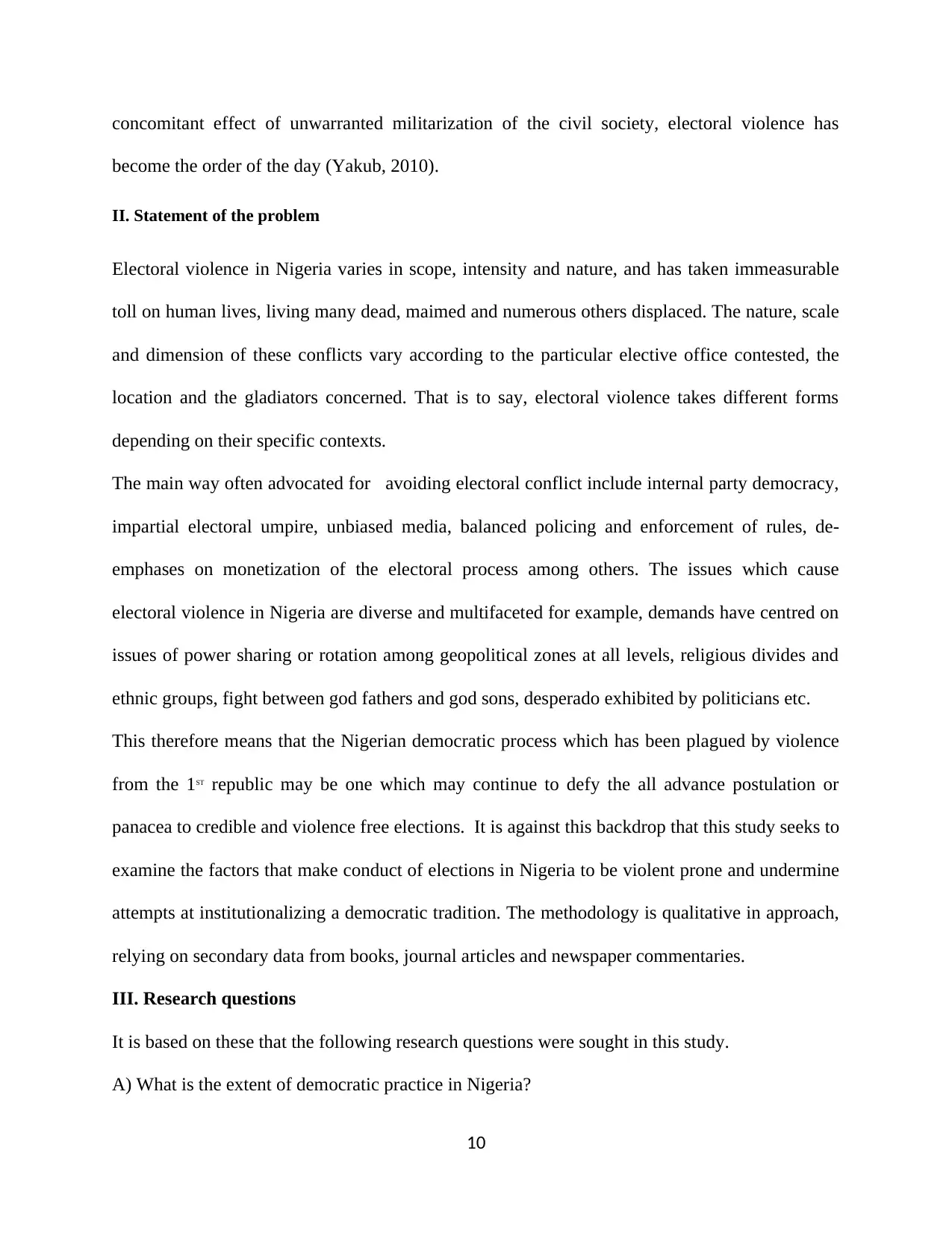
concomitant effect of unwarranted militarization of the civil society, electoral violence has
become the order of the day (Yakub, 2010).
II. Statement of the problem
Electoral violence in Nigeria varies in scope, intensity and nature, and has taken immeasurable
toll on human lives, living many dead, maimed and numerous others displaced. The nature, scale
and dimension of these conflicts vary according to the particular elective office contested, the
location and the gladiators concerned. That is to say, electoral violence takes different forms
depending on their specific contexts.
The main way often advocated for avoiding electoral conflict include internal party democracy,
impartial electoral umpire, unbiased media, balanced policing and enforcement of rules, de-
emphases on monetization of the electoral process among others. The issues which cause
electoral violence in Nigeria are diverse and multifaceted for example, demands have centred on
issues of power sharing or rotation among geopolitical zones at all levels, religious divides and
ethnic groups, fight between god fathers and god sons, desperado exhibited by politicians etc.
This therefore means that the Nigerian democratic process which has been plagued by violence
from the 1ST republic may be one which may continue to defy the all advance postulation or
panacea to credible and violence free elections. It is against this backdrop that this study seeks to
examine the factors that make conduct of elections in Nigeria to be violent prone and undermine
attempts at institutionalizing a democratic tradition. The methodology is qualitative in approach,
relying on secondary data from books, journal articles and newspaper commentaries.
III. Research questions
It is based on these that the following research questions were sought in this study.
A) What is the extent of democratic practice in Nigeria?
10
become the order of the day (Yakub, 2010).
II. Statement of the problem
Electoral violence in Nigeria varies in scope, intensity and nature, and has taken immeasurable
toll on human lives, living many dead, maimed and numerous others displaced. The nature, scale
and dimension of these conflicts vary according to the particular elective office contested, the
location and the gladiators concerned. That is to say, electoral violence takes different forms
depending on their specific contexts.
The main way often advocated for avoiding electoral conflict include internal party democracy,
impartial electoral umpire, unbiased media, balanced policing and enforcement of rules, de-
emphases on monetization of the electoral process among others. The issues which cause
electoral violence in Nigeria are diverse and multifaceted for example, demands have centred on
issues of power sharing or rotation among geopolitical zones at all levels, religious divides and
ethnic groups, fight between god fathers and god sons, desperado exhibited by politicians etc.
This therefore means that the Nigerian democratic process which has been plagued by violence
from the 1ST republic may be one which may continue to defy the all advance postulation or
panacea to credible and violence free elections. It is against this backdrop that this study seeks to
examine the factors that make conduct of elections in Nigeria to be violent prone and undermine
attempts at institutionalizing a democratic tradition. The methodology is qualitative in approach,
relying on secondary data from books, journal articles and newspaper commentaries.
III. Research questions
It is based on these that the following research questions were sought in this study.
A) What is the extent of democratic practice in Nigeria?
10
Paraphrase This Document
Need a fresh take? Get an instant paraphrase of this document with our AI Paraphraser
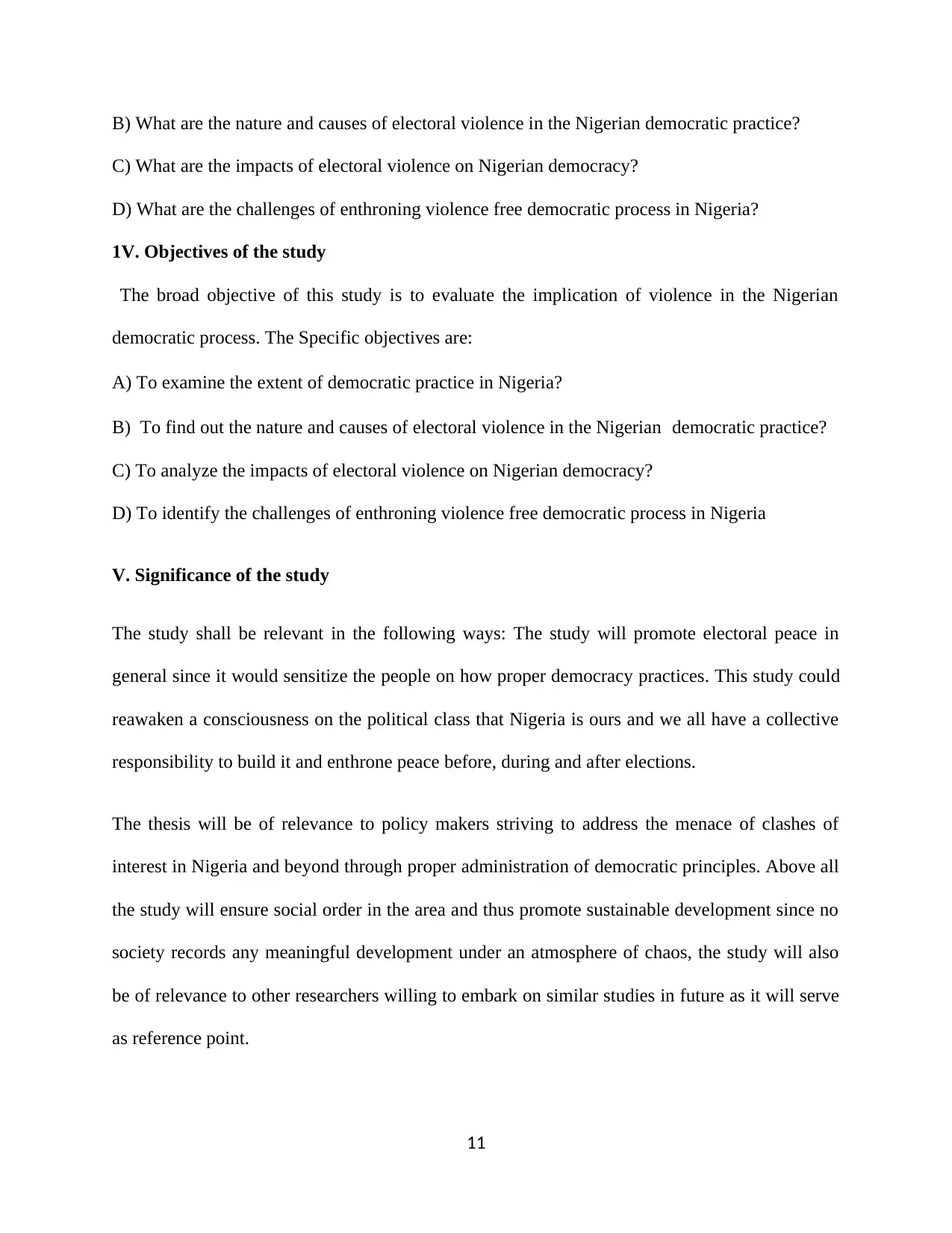
B) What are the nature and causes of electoral violence in the Nigerian democratic practice?
C) What are the impacts of electoral violence on Nigerian democracy?
D) What are the challenges of enthroning violence free democratic process in Nigeria?
1V. Objectives of the study
The broad objective of this study is to evaluate the implication of violence in the Nigerian
democratic process. The Specific objectives are:
A) To examine the extent of democratic practice in Nigeria?
B) To find out the nature and causes of electoral violence in the Nigerian democratic practice?
C) To analyze the impacts of electoral violence on Nigerian democracy?
D) To identify the challenges of enthroning violence free democratic process in Nigeria
V. Significance of the study
The study shall be relevant in the following ways: The study will promote electoral peace in
general since it would sensitize the people on how proper democracy practices. This study could
reawaken a consciousness on the political class that Nigeria is ours and we all have a collective
responsibility to build it and enthrone peace before, during and after elections.
The thesis will be of relevance to policy makers striving to address the menace of clashes of
interest in Nigeria and beyond through proper administration of democratic principles. Above all
the study will ensure social order in the area and thus promote sustainable development since no
society records any meaningful development under an atmosphere of chaos, the study will also
be of relevance to other researchers willing to embark on similar studies in future as it will serve
as reference point.
11
C) What are the impacts of electoral violence on Nigerian democracy?
D) What are the challenges of enthroning violence free democratic process in Nigeria?
1V. Objectives of the study
The broad objective of this study is to evaluate the implication of violence in the Nigerian
democratic process. The Specific objectives are:
A) To examine the extent of democratic practice in Nigeria?
B) To find out the nature and causes of electoral violence in the Nigerian democratic practice?
C) To analyze the impacts of electoral violence on Nigerian democracy?
D) To identify the challenges of enthroning violence free democratic process in Nigeria
V. Significance of the study
The study shall be relevant in the following ways: The study will promote electoral peace in
general since it would sensitize the people on how proper democracy practices. This study could
reawaken a consciousness on the political class that Nigeria is ours and we all have a collective
responsibility to build it and enthrone peace before, during and after elections.
The thesis will be of relevance to policy makers striving to address the menace of clashes of
interest in Nigeria and beyond through proper administration of democratic principles. Above all
the study will ensure social order in the area and thus promote sustainable development since no
society records any meaningful development under an atmosphere of chaos, the study will also
be of relevance to other researchers willing to embark on similar studies in future as it will serve
as reference point.
11
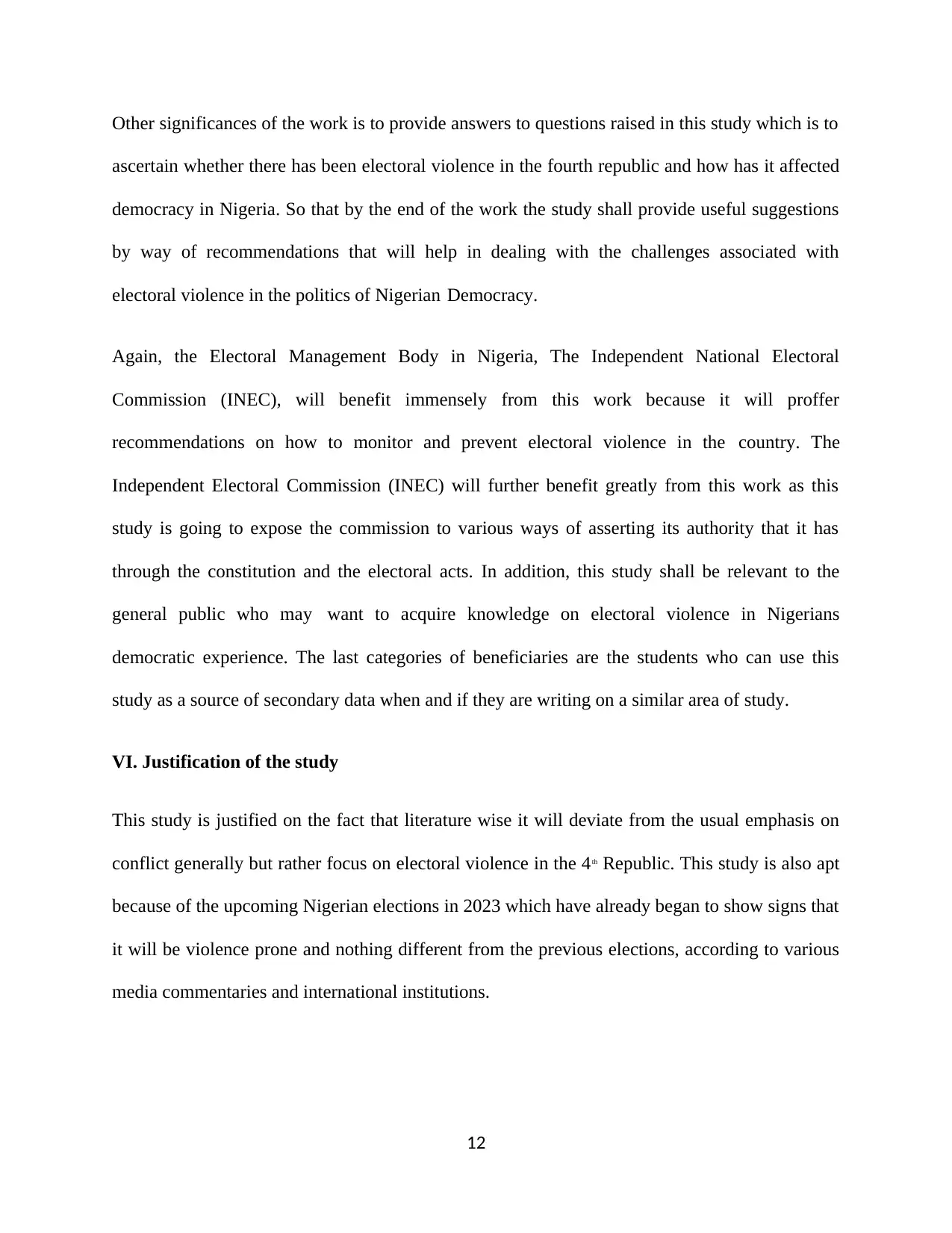
Other significances of the work is to provide answers to questions raised in this study which is to
ascertain whether there has been electoral violence in the fourth republic and how has it affected
democracy in Nigeria. So that by the end of the work the study shall provide useful suggestions
by way of recommendations that will help in dealing with the challenges associated with
electoral violence in the politics of Nigerian Democracy.
Again, the Electoral Management Body in Nigeria, The Independent National Electoral
Commission (INEC), will benefit immensely from this work because it will proffer
recommendations on how to monitor and prevent electoral violence in the country. The
Independent Electoral Commission (INEC) will further benefit greatly from this work as this
study is going to expose the commission to various ways of asserting its authority that it has
through the constitution and the electoral acts. In addition, this study shall be relevant to the
general public who may want to acquire knowledge on electoral violence in Nigerians
democratic experience. The last categories of beneficiaries are the students who can use this
study as a source of secondary data when and if they are writing on a similar area of study.
VI. Justification of the study
This study is justified on the fact that literature wise it will deviate from the usual emphasis on
conflict generally but rather focus on electoral violence in the 4th Republic. This study is also apt
because of the upcoming Nigerian elections in 2023 which have already began to show signs that
it will be violence prone and nothing different from the previous elections, according to various
media commentaries and international institutions.
12
ascertain whether there has been electoral violence in the fourth republic and how has it affected
democracy in Nigeria. So that by the end of the work the study shall provide useful suggestions
by way of recommendations that will help in dealing with the challenges associated with
electoral violence in the politics of Nigerian Democracy.
Again, the Electoral Management Body in Nigeria, The Independent National Electoral
Commission (INEC), will benefit immensely from this work because it will proffer
recommendations on how to monitor and prevent electoral violence in the country. The
Independent Electoral Commission (INEC) will further benefit greatly from this work as this
study is going to expose the commission to various ways of asserting its authority that it has
through the constitution and the electoral acts. In addition, this study shall be relevant to the
general public who may want to acquire knowledge on electoral violence in Nigerians
democratic experience. The last categories of beneficiaries are the students who can use this
study as a source of secondary data when and if they are writing on a similar area of study.
VI. Justification of the study
This study is justified on the fact that literature wise it will deviate from the usual emphasis on
conflict generally but rather focus on electoral violence in the 4th Republic. This study is also apt
because of the upcoming Nigerian elections in 2023 which have already began to show signs that
it will be violence prone and nothing different from the previous elections, according to various
media commentaries and international institutions.
12
⊘ This is a preview!⊘
Do you want full access?
Subscribe today to unlock all pages.

Trusted by 1+ million students worldwide
1 out of 69
Your All-in-One AI-Powered Toolkit for Academic Success.
+13062052269
info@desklib.com
Available 24*7 on WhatsApp / Email
![[object Object]](/_next/static/media/star-bottom.7253800d.svg)
Unlock your academic potential
Copyright © 2020–2025 A2Z Services. All Rights Reserved. Developed and managed by ZUCOL.